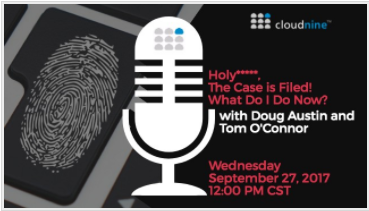Court Opts for Lesser Sanction for Failure to Preserve Electronic Vehicle Data: eDiscovery Case Law
In Barry v. Big M Transportation, Inc., et al., No. 1:16-cv-00167-JEO (N.D. Ala. Sep. 11, 2017), Alabama Chief Magistrate Judge John E. Ott denied the plaintiffs’ request for default judgment sanctions for failing to preserve a tractor-trailer involved in an automobile accident and its “Electronic Data/Electronic Control Module (ECM) Vehicle Data Recorder/Black Box” and the data associated with the ECM device. As an alternative sanction, Judge Ott indicated the intent to tell the jury that the ECM data was not preserved and to allow the parties to present evidence and argument at trial regarding the defendant’s failure to preserve the data.
Case Background
In this case arising out of a motor vehicle accident which was filed in Alabama state court and then removed to federal court, the plaintiffs sought to recover compensatory and punitive damages for their injuries and asserted claims against the trucking company and the driver of the truck. Both defendants filed a motion for summary judgment on the plaintiffs’ claims and the plaintiffs filed a motion for partial summary judgment on the defendants’ affirmative defenses of contributory negligence, assumption of the risk, and intervening cause, as well as a “spoliation sanction” in the form of either a default judgment on the defendants’ negligence liability or an order judicially establishing certain facts against the defendants.
As a part of their motion for partial summary judgment, the plaintiffs requested a spoliation sanction against the defendants for their failure to preserve the tractor’s ECM data following the accident (or the tractor for that matter, which was sold), moving for either a default judgment on the defendants’ negligence liability or an order by the Court establishing “the speed [at] which {the driver} was driving and the maneuvers he made in the light most favorable” to the plaintiffs. In response, the defendants argued that the failure to preserve the ECM data was “well-reasoned and justifiable” and even if seen as not reasonable, didn’t warrant the imposition of sanctions. In addition, the driver defendant argued that he had no duty to preserve the tractor’s ECM data at the time of the accident or had any custody or control over the tractor following the accident.
Judge’s Ruling
In considering the request for sanctions, Judge Ott found that “Big M—but not Shaffer—is guilty of spoliation. Big M’s corporate representative, Benton Elliott, confirmed that it is Big M’s normal practice to retrieve the ECM data from a tractor if they know a collision is severe, and he admitted that there was nothing preventing Big M from preserving the ECM data in this instance.”
However, Judge Ott indicated that he was “unwilling to impose either of the severe sanctions requested by the Barrys for a number of reasons”, including 1) he was “not convinced that Big M acted with the intent to deprive the Barrys of the use of the ECM data”, that 2) “it was Big M’s impression that the Barrys were at fault for the accident”, that 3) “the Barrys have not been prejudiced to such an extent that the severe sanctions they have requested would be warranted” and 4) “the Barrys have not shown that Shaffer bears any responsibility for the loss of the ECM data.”
As a result, Judge Ott ruled that “the Barrys’ request for spoliation sanctions will be denied to the extent they have asked the Court to enter a default judgment on the Defendants’ negligence liability or, alternatively, to enter an order judicially establishing the speed at which Shaffer was driving and the maneuvers he made prior to impact in the light most favorable to the Barrys. However, as an alternative sanction, the Court intends to tell the jury that the ECM data was not preserved and will allow the parties to present evidence and argument at trial regarding Big M’s failure to preserve the data.”
So, what do you think? Is that a sufficient sanction for failing to preserve the truck and the ECM data? Please share any comments you might have or if you’d like to know more about a particular topic.
Also, I’m excited to report that eDiscovery Daily has been nominated to participate in The Expert Institute’s Best Legal Blog Contest in the Legal Tech category! Thanks to whoever nominated us! If you enjoy our blog, you can vote for it and help it win a spot in their Best Legal Blogs Hall of Fame. You can cast a vote for the blog here. Thanks!

Case opinion link courtesy of eDiscovery Assistant.
Disclaimer: The views represented herein are exclusively the views of the author, and do not necessarily represent the views held by CloudNine. eDiscovery Daily is made available by CloudNine solely for educational purposes to provide general information about general eDiscovery principles and not to provide specific legal advice applicable to any particular circumstance. eDiscovery Daily should not be used as a substitute for competent legal advice from a lawyer you have retained and who has agreed to represent you.






